The new agreement with the U.S. to turn away asylum seekers coming through unofficial border crossings in Canada will cost people their lives, migrant rights groups are warning.
The agreement announced amid President Joe Biden’s first visit to Canada came into effect across the entire border at 12:01 a.m. on March 25, according to a joint release by the Prime Minister’s office and Biden. Officials on both sides of the border will now be able to turn away any migrants attempting to cross into the other country.
The new agreement says that any refugee who crosses irregularly into Canada from the US—or vice-versa—will be turned back without having their asylum claim heard if they are apprehended by immigration authorities in the first 14 days after crossing. It is unclear whether the policy applies retroactively to those who have crossed in the past 14 days.
But a crackdown on the border won’t stop the flow of migrants determined to make it into the country, migrants say. Instead it’ll just make it more deadly for those set on risking their lives for the hope of a better life.
“It will only create further suffering, abuse and death,” said Syed Hussan, speaking on behalf of the Migrant Rights Network. It represents 40 migrant justice groups across Canada.
“They’ll try to remain underground for 14 days as they wait out this time period before they can apply for refugee status, if they can apply. During this process they’ll be hunted,” he said. “This is a massive expansion of surveillance, intimidation and criminalization of people of colour.”
The new policy will close the unofficial crossing at Roxham Road between Quebec and New York, where tens of thousands of migrants have requested asylum over the last decade under the Safe Third Country Agreement. In 2022 nearly 40,000 crossed into Canada through it.
The Safe Third Country Agreement is a treaty between the United States and Canada which has been in effect since 2004. The treaty stipulates that any refugee claimant must apply for refugee status in the first “safe country” they arrive in—with the US and Canada both being designated as safe countries. This means that migrants cannot apply for refugee status in Canada after having set foot in the United States, or vice versa.
However, up until this recent agreement, the Safe Third Country Agreement only applied to official ports of entry, not irregular crossings like Roxham Road. This new agreement expands the Agreement to the full land border coming into either country.
“To address irregular migration, we are expanding the Safe Third Country Agreement to apply not only at designated ports of entry, but across the entire land border, including internal waterways, ensuring fairness and more orderly migration between our two countries,” the Prime Minister’s Office wrote in a statement Friday.
Much of the nearly 40,000 asylum seekers that came into Canada through irregular passings in 2022 did so through the entry at Roxham Road. But with a border spanning roughly 8,900 kilometres people will keep coming through, Hussan said, just now they’ll be forced to take more risks to avoid detection.
“Already Roxham Road is a dangerous route, two people have died crossing it,” said Hussan, also the executive director of the Migrant Workers Alliance for Change
“This is a massive expansion of surveillance, intimidation and criminalization of people of colour” —Syed Hussan, Migrant Rights Network
Within the first two months of the year both Fritznel Richard, 43, and Jose Leos Cervantes, 45, lost their lives while attempting to reach the road to cross from Canada into the U.S.
While the details of the agreement were made public this Friday after being leaked to the media on Wednesday, U.S. documents from the Federal Register reveal the agreement was actually signed in secret by the two leaders last spring.
In his address to the Canadian Parliament Biden said the new agreement would discourage “unlawful migration that feeds exploitation and human trafficking.”
“This is really disappointing and horrific for migrants,” said Hady Anne. “They just play games with people’s lives.”
He came through Roxham Road himself in 2018 after making his way to the U.S. from his home country of Mauritania. He spoke on behalf of Solidarity Across Borders, a Quebec-based migrant rights group has called for the abolition of the Safe Third Country Agreement, and permanent resident status for all migrants.
“There should not be a Safe Third Country Agreement. Let people go where they want to go and ask for asylum.”
‘Canada is refusing to hear people’s refugee claims’
Some say the new agreement goes against international conventions Canada has signed over protecting refugees.
“We have obligations to those who come here to seek asylum,” said lawyer Stéphanie Valois, also the president of the Quebec association of immigration lawyers (AQAADI).
“People found on Canadian territory within their first 14 days will be up for deportation to the United States, without having their demand for asylum heard,” Valois said about what’s known so far about the agreement. “That’s what’s most concerning for us at the moment.”
Under the United Nations Convention relating to the Status of Refugees, Canada is responsible for protecting refugees from being returned to countries where they could face “serious threats to their life or freedom.” The 1951 convention also states all claims for asylum should be heard fairly before being refused.
“Turning people away at the border effectively means Canada is refusing to hear people’s refugee claims,” Hussan said.
Human-rights organizations like the Canadian Council for Refugees and Amnesty International are currently challenging the constitutionality of the original Safe Third Country Agreement before the Supreme Court of Canada. The country’s highest court is expected to make a decision soon after hearing arguments last October.
The groups assert the U.S. is not a safe country for refugees. The conditions asylum seekers often have to endure also go against individual rights to life, liberty and security enshrined in the Charter of Rights and Freedoms.
“People fleeing their home countries, and then risking their lives by crossing irregularly into Canada, would not take such drastic steps if the United States’ immigration and refugee-protection system could be counted on to respect migrants’ rights,” Amnesty International wrote in a statement soon after the announcement of the agreement.
“It is also unconscionable that the government would take this step while the constitutionality of the Safe Third Country Agreement is under review by the Supreme Court of Canada.”
Many of the details of the new agreement have yet to be released. The two leaders also announced Canada will welcome 15,000 humanitarian migrants from the Western Hemisphere over the next year, describing it as part of their commitment to “an alternative to irregular migration.”
Exactly how these migrants will be chosen is still unknown. It’s also unclear whether this number is in addition to immigration goals Canada has already set, Hussan added.
Federal data shows Canada accepted over 616,000 Ukrainians to the country in 2022. It also approved nearly 2.1 million work and study visas. Those who cross by foot, often people of colour, are in the minority, but have faced the brunt of growing hostility towards migrants.
“Prime Minister Trudeau has caved to populist and racist anti-immigrant pressure,” Hussan said.
“We have not heard the same conversation around for example the 600,000 plus Ukrainians who’ve been approved to come to the country. This is simply racism.”







